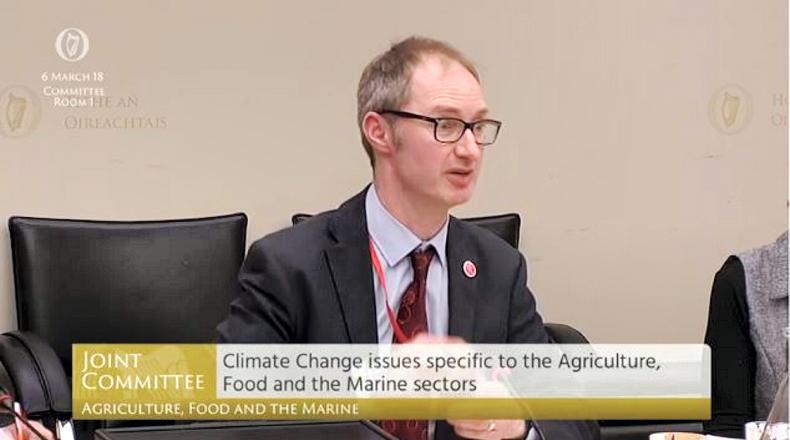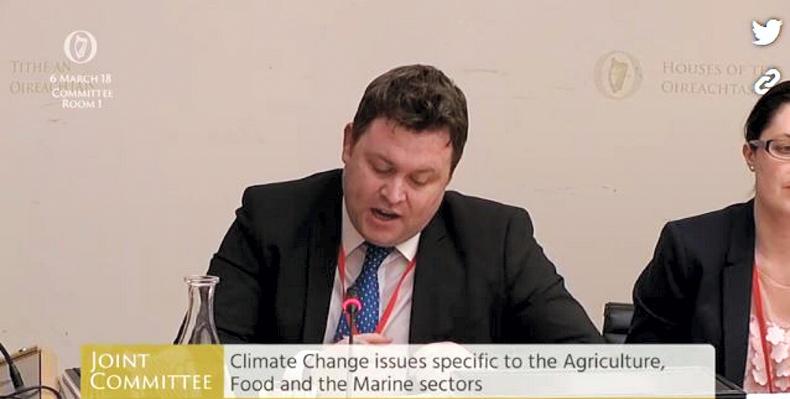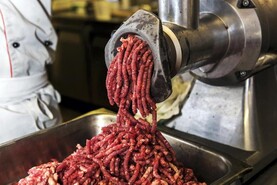There is little point in Irish farmers dramatically changing their approach if it only has a small impact on the global emissions problem, Gillian Westbrook from the Irish Organic Growers Association (IOFGA) told the Joint Oireachtas Committee on Agriculture.
In its third public meeting on climate change, the committee heard from the Environmental Protection Agency (EPA), Environmental Pillar, Stop Climate Chaos Coalition, Marine Institute, Dairy Industry Ireland (DII), IOFGA, Teagasc and the ICSA.
“Why are emissions from fossil fuels attributed to the countries where they are consumed whereas food production emissions are attributed to the countries where the food is grown?” asked Patrick Kent, president of the ICSA. “Ireland should not shoulder all of the responsibility for food produced which is actually destined for consumption in other countries both within and outside the European Union.”
He added that schemes under the Rural Development Programme can make a difference but they must be refocused so that they “make a real difference to farmer’s incomes. We should favour solar panels on sheds also".
Dairy sustainability
Meanwhile, a representative from Dairy Industry Ireland outlined the sustainability work of milk processors, using a farm pilot scheme. Phase 1 of Dairy Sustainability Ireland is focusing on soil fertility, water quality improvement and farmyard management. It is currently being rolled out nationwide through the dairy industry’s farm advice service and with the support of Teagasc.
“To put climate change seriousness into context – environment and sustainability are the first and second agenda items of the board of DII. Brexit is the third item after the above,” said Conor Mulvihill, director of Dairy Industry Ireland.
He added that members of DII are funding 10 new sustainability advisors to be recruited as soon as possible.
Environmental groups
Some of the views expressed to the committee by environmental groups demanded more radical action.
“Irish agricultural emissions are now rising at 3% per year, with dairy cow numbers increasing by 6%. The figure was a 2.7% increase in emissions in 2016,” said Michael Ewing, coordinator of the Environmental Pillar. “Ireland is focusing on beef and dairy expansion, which contradicts the national policy position on climate change, which has been misleadingly justified on the basis of our capacity for sustainable food production. Ireland is contributing to global food production in terms of beef and dairy exports but what this is mainly doing is exporting a western beef and dairy diet which is not meeting the needs of the poorest and hungriest. There’s an argument that Ireland does beef and dairy more efficiently, but the efficiency measures that have been gained are marginal and are being undermined by increased production.”

Oisin Coghlan from Friends of the Earth.
Oisin Coghlan from Friends of the Earth suggested a carbon tax or something more tangible for consumers such as cheaper electricity from solar panels.
Carbon tax
“Farming and food production must happen in harmony with the environment. Things have to change but they have to work for farmers and rural communities as they are the people who will have to implement the changes,” said Dr Matthew Crowe from the EPA. “Carbon is the key part of the policy plank up to 2050, forest land is a major sink but when you add everything up in relation to land in Ireland it is a net source. It should become a net sink.”
The Committee, chaired by Pat Deering TD, will publish a report on its findings from the public meetings on climate change in the coming months.
Read more
IFA calls for climate activation programme
Industry opposes carbon tax before Oireachtas agriculture committee
Suckler cows and jumbo jets – the great carbon debate
Rover not even safe in carbon debate
Feed additive reduces greenhouse gas from cattle
Ag without animals a non runner - US study
There is little point in Irish farmers dramatically changing their approach if it only has a small impact on the global emissions problem, Gillian Westbrook from the Irish Organic Growers Association (IOFGA) told the Joint Oireachtas Committee on Agriculture.
In its third public meeting on climate change, the committee heard from the Environmental Protection Agency (EPA), Environmental Pillar, Stop Climate Chaos Coalition, Marine Institute, Dairy Industry Ireland (DII), IOFGA, Teagasc and the ICSA.
“Why are emissions from fossil fuels attributed to the countries where they are consumed whereas food production emissions are attributed to the countries where the food is grown?” asked Patrick Kent, president of the ICSA. “Ireland should not shoulder all of the responsibility for food produced which is actually destined for consumption in other countries both within and outside the European Union.”
He added that schemes under the Rural Development Programme can make a difference but they must be refocused so that they “make a real difference to farmer’s incomes. We should favour solar panels on sheds also".
Dairy sustainability
Meanwhile, a representative from Dairy Industry Ireland outlined the sustainability work of milk processors, using a farm pilot scheme. Phase 1 of Dairy Sustainability Ireland is focusing on soil fertility, water quality improvement and farmyard management. It is currently being rolled out nationwide through the dairy industry’s farm advice service and with the support of Teagasc.
“To put climate change seriousness into context – environment and sustainability are the first and second agenda items of the board of DII. Brexit is the third item after the above,” said Conor Mulvihill, director of Dairy Industry Ireland.
He added that members of DII are funding 10 new sustainability advisors to be recruited as soon as possible.
Environmental groups
Some of the views expressed to the committee by environmental groups demanded more radical action.
“Irish agricultural emissions are now rising at 3% per year, with dairy cow numbers increasing by 6%. The figure was a 2.7% increase in emissions in 2016,” said Michael Ewing, coordinator of the Environmental Pillar. “Ireland is focusing on beef and dairy expansion, which contradicts the national policy position on climate change, which has been misleadingly justified on the basis of our capacity for sustainable food production. Ireland is contributing to global food production in terms of beef and dairy exports but what this is mainly doing is exporting a western beef and dairy diet which is not meeting the needs of the poorest and hungriest. There’s an argument that Ireland does beef and dairy more efficiently, but the efficiency measures that have been gained are marginal and are being undermined by increased production.”

Oisin Coghlan from Friends of the Earth.
Oisin Coghlan from Friends of the Earth suggested a carbon tax or something more tangible for consumers such as cheaper electricity from solar panels.
Carbon tax
“Farming and food production must happen in harmony with the environment. Things have to change but they have to work for farmers and rural communities as they are the people who will have to implement the changes,” said Dr Matthew Crowe from the EPA. “Carbon is the key part of the policy plank up to 2050, forest land is a major sink but when you add everything up in relation to land in Ireland it is a net source. It should become a net sink.”
The Committee, chaired by Pat Deering TD, will publish a report on its findings from the public meetings on climate change in the coming months.
Read more
IFA calls for climate activation programme
Industry opposes carbon tax before Oireachtas agriculture committee
Suckler cows and jumbo jets – the great carbon debate
Rover not even safe in carbon debate
Feed additive reduces greenhouse gas from cattle
Ag without animals a non runner - US study







 This is a subscriber-only article
This is a subscriber-only article










SHARING OPTIONS: